There are a lot of talking points to consider when it comes to smart waste management – and this is a good thing because it means that there are many ways for companies to be proactive about their business.
In this article, we will talk about some of the things that we should try to consider when working on Smart Waste Management.
What Is Smart Waste Management?
Smart waste management is a process of optimizing and controlling the use of resources by using information technology. The goal is to reduce the amount of waste created and to improve the quality of life by recycling materials.
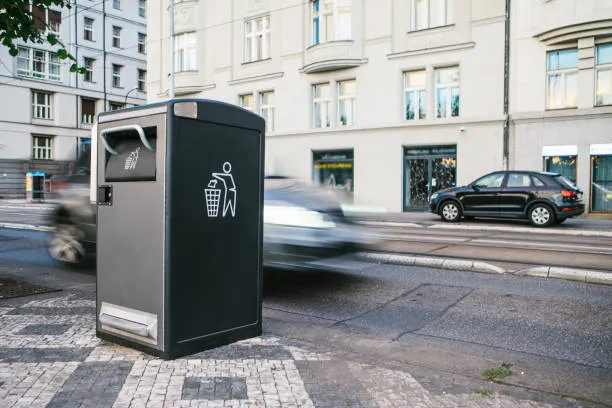
Smart waste management is the process of managing waste in an environmentally responsible way.
By using technology and data, organizations can streamline their waste management processes to reduce environmental impact and save money.
Smart waste management is a systemized approach to managing waste that utilizes knowledge of the waste stream and the environment.
This system is designed to optimize the use of resources, reduce environmental impact, and improve safety.
Smart waste management systems can be divided into two categories: automated and manual.
Automated systems use sensors or computer algorithms to identify and track waste generation, composition, and disposal behavior.
They then use this information to make decisions about how to manage the waste. Manual systems rely on staff to make decisions about waste handling based on their experience and knowledge of the local environment.
Many municipalities are starting to adopt smart waste management systems in order to improve efficiency, minimize environmental impact, and protect public health.
Related Topic
⦿ There are many benefits to using a smart waste management system, including:
- Reduced Waste Volume: Smart systems can identify which materials can be recycled or composted and which need to be disposed of in an environmentally friendly way. This reduces the amount of waste material that needs to be disposed of.
- Optimized Use of Resources: By understanding which materials are being produced and how they will be used, a smart system can optimize the use of resources. This can save money by reducing the number of resources that need to be disposed of.
- Reduced Waste Handling Costs: A smart waste management system can reduce the cost of collecting and disposing of waste by automatically identifying the materials that need to go through the process. This will allow businesses and cities to handle less waste without increasing costs.
- Improved Quality of Garbage Disposal: Using a smart waste management system allows for better control of the amount and quality of garbage that is being produced.
This will lead to an improved quality of disposal, which is important because it eliminates risks associated with improper disposal.
A smart waste management system uses sensor technology in order to help identify recyclables and non-recyclable materials.
The information gathered from these sensors is used in order to improve efficiency, minimize environmentally
Why Is Smart Waste Management Important?
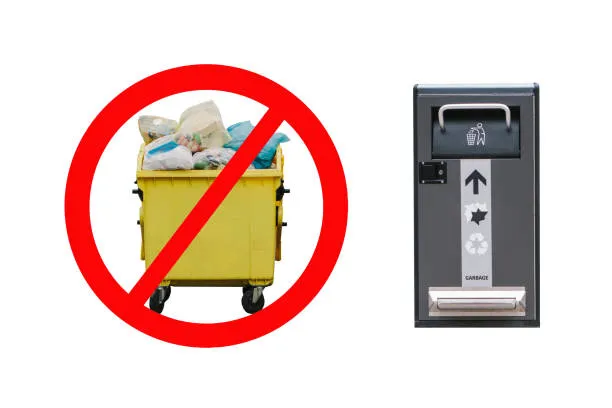
Smart waste management is important because it helps to reduce the amount of waste that is produced, and it also helps to improve the environment.
By using technology to manage waste, businesses can save money and protect the environment.
Waste management is one of the most important aspects of sustainability. It is essential that we find ways to reduce the amount of waste that we produce and dispose of responsibly.
By implementing smart waste management practices, we can help to minimize the impact that our waste has on the environment and our health.
⦿ Here are some reasons why smart waste management is so important:
- Smart waste management can help to reduce the amount of waste that ends up in landfills. By using smart technology to monitor and manage our solid waste, we can ensure that only necessary items are sent to the landfill. This can save both time and money unit.
- Smart waste management can also help to reduce the number of environmental pollutants containers that are released into the air when the trash is burned. By intelligently sorting and recycling materials, we can reduce the number of toxic issue substances that are produced.
- Finally, smart waste management can also help to improve our health by reducing exposure to hazardous materials used in trash disposal. By using safe and recycled materials, we can protect ourselves from containers’ harmful toxins.
⦿ Here are some basic points about why Smart Waste Management is Important
- It is better for the environment. Your trash doesn’t have to be burnt in a landfill. Instead, it can be disposed of in an environmentally-friendly way.
- It is better for the circular economy! In many cases, recycling bins and composting are cheaper than burning garbage.
- It is better for our health. You will be reducing your exposure to hazardous materials used in the disposal process.
- It’s good for the community. Proper waste management has a positive effect on local economies and our environment.
- It’s good for your wallet! Many cities and counties offer incentives to residents who put their trash out the right way.
What are the types of waste management?
Waste management is the process of taking care of the waste that is produced by a person or organization.
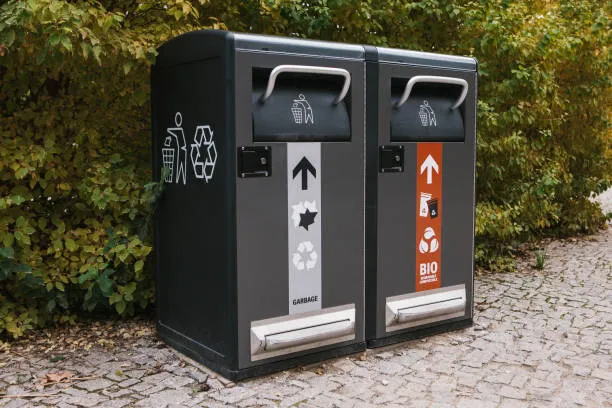
⦿ There are several different types of waste management, each with its own unique benefits.
1. Recycling is the process of reusing materials that would otherwise be thrown away.
2. Composting is the process of decomposing organic waste in order to create rich soil for use on farms.
3. Disposal is the act of throwing away waste that results in it being buried or disposed into water or landfills.
4. Reuse is the process of using materials once they have reached their end of life or when they are no longer useful.
5. Reduction is the act of decreasing the number of resources used by making small changes to your habits and behaviors.
6. Replenishment is the process of replacing materials that are continually used up and being replaced with new resources.
In other words, by reducing, reusing, replenishment, and reduction all in your daily life you can help mitigate the effects of climate change on our planet.
These six principles form a framework to construct a circular economy where we have no waste at all.
How does smart waste management work?
Smart Waste Management is a process of managing materials in an organized and sustainable way. This involves sorting and segregating recyclable materials, composting organic material, and disposing of hazardous or non-recyclable materials properly.

It also helps reduce the amount of waste that ends up in landfills.
⦿ There are many different ways to implement smart waste management in your organization.
- One option is to create a centralized system that coordinates the handling of all materials.
- Alternatively, you can set up individual systems for each department or area of your business.
- Either way, you need to make sure that your systems are effective and efficient.
- One important factor to consider when implementing smart waste management is privacy. You don’t want employees to feel embarrassed about bringing in their recycling, so it’s important to create a system that’s discreet and easy to use.
- Additionally, you need to make sure that your systems are accessible during peak hours so that everyone can take part in the program.
- Waste management is about making sure that our waste is handled in a responsible manner and that it does not end up polluting our environment.
⦿ There are different ways to manage our waste, but one of the most common ways is to use smart waste management.
Smart waste management is a process that uses technology to identify and track the movement of waste.
This information is then used to make sure that the waste is collected and disposed of in a responsible way.
Smart waste management is a process whereby waste is collected and sorted using sensors and software to detect when a product is no longer usable or valuable.
Smart waste management is a way to manage waste in an environmentally friendly way. There are different ways to do smart waste management, but the basic idea is to use technology to help us waste less and recycle more.
⦿ Some examples of ways that smart waste management can be used are to:
- Track how much waste is being produced and where it is being produced so that it can be tracked and managed more effectively;
- Automatically detect when a bin is full and send a notification to the user so that they can take the garbage out;
- Allow users to donate usable materials to charity through an app or website;
- Create alerts when recyclable materials reach their expiration date so that they can be recycled sooner.
- Reduce emissions by collecting electronic devices to reduce energy consumption in data centers.
⦿ Today, the market for waste management technology is split into two categories:
1) trash-to-energy systems
2) large centralized waste management platforms.
How Do Cities Currently Manage Their Waste?
Currently, cities manage their waste in a variety of ways. Some recycle more than others, and some have programs that allow residents to fill up their garbage trash cans with recycling instead of regular trash.

Some cities have strict regulations about what can and cannot be thrown away, while others have more liberal policies. In general, however, each city manages its waste in a way that is best suited to its own needs.
Cities around the world are constantly facing the challenge of how to manage their waste. Some try to recycle as much as possible, while others simply dump it all into landfills.
- There are a variety of ways that cities manage their waste, but each has its own set of benefits and drawbacks.
- This article will discuss how some of the most popular waste management methods work, and what their advantages and disadvantages are.
⦿ The three most common methods for managing waste in cities are recycling, landfill dumping, and collection and disposal by truck.
- Recycling is the most environmentally friendly approach, as it reduces the amount of trash that ends up in landfills. It also creates jobs in the recycling industry, which can help reduce poverty rates in cities.
- Landfill dumping is the least environmentally friendly option, as it releases pollution into the air and water. It also costs more than other methods to operate, meaning that it is not always economically viable to use landfill dumping.
- Collection and disposal by truck is the middle ground between recycling and landfill dumping. It is more environmentally friendly than landfill dumping but less so than recycling.
⦿ Here are some basic points about How Do Cities Currently Manage Their Waste
- Landfills or Recycling
- Dump in a river, riverbank, or body of water
- Compost
- Trash incineration plant
- Incinerator
- Reuse
- Compost
- Compactors
- Collectors
- Sewage treatment plants
- Water treatment
- Landfills
How Smart Cities are Leveraging IoT for Waste Management
Smart Cities are utilizing IoT to manage waste. By using sensors and data analytics, they can optimize the process of waste disposal while reducing environmental impact.
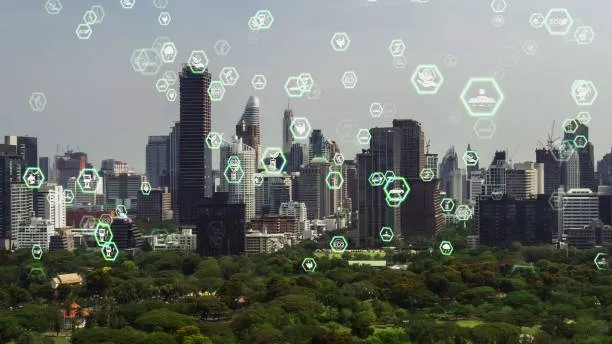
In a smart city, waste is managed in an environmentally-friendly way. Sensors are placed throughout the city to collect data on waste generation and disposal.
This data is analyzed to create models that optimize the process of waste disposal.
⦿ Here are some basic points about how Smart Cities are Leveraging IoT for Waste Management
- By optimizing the process, cities can reduce environmental impact. Smart cities are also able to improve public health by preventing the disease from spreading through waste.
- Additionally, they can save money by reducing the amount of waste that needs to be disposed of.
- Smart Cities are leveraging IoT for waste management in a variety of ways. One way is to use sensors to identify when trash has reached a set threshold, and then trigger an automated collection.
- in another example, smart cities are using IoT to monitor and optimize recycling processes. By understanding the types of materials being recycled, city officials can ensure that resources are being used most efficiently.
- Another way smart cities are using IoT for waste management is by using it to create digital maps of where waste is located and how it is being disposed of.
- This information can be used to improve sanitation systems and make better decisions about where to allocate resources.
- Smart cities are using IoT to create virtual waste collection trucks that can autonomously collect waste from specific areas.
- As the technology matures, garbage trucks will be able to make better decisions about picking up specific types of waste.
- This approach can help reduce costs and improve the efficiency of collection procedures.
- Waste management is an incredibly expensive profession, but using IoT technology to monitor it can lead to huge reductions in waste disposal costs. Use these posts as a guide for your own smart city project!
How Are Smart Cities Being Used?
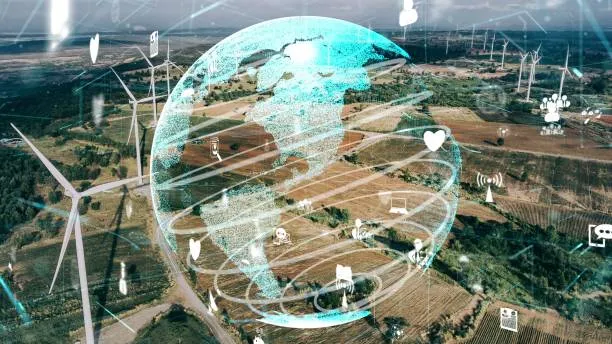
⦿ A few examples of how cities are using smart technologies are
- To Monitor traffic patterns
- To Manage parking lots and garages
- To Automate security systems and CCTV cameras
- To Optimize traffic flow
- To Monitor infrastructure conditions
- To Remotely control street lights
- To Track waste management and recycling
- To Optimize energy efficiency
- To Monitor pollution levels
- To Reduce crime
- To Monitor construction zones
- To Provide residents with information through all our social media outlets
By doing this, cities can reduce the amount of wasted time and resources needed to collect garbage.
How IoT-based Waste Management Systems Work under the Hood
Smart waste management systems are designed to automate and optimize the waste management process by collecting, sorting, and transporting waste to the appropriate location.
These systems can be implemented using IoT technology, which allows them to monitor and manage the entire waste management process from start to finish.
- One of the key benefits of using a smart waste management system is that it can improve efficiency and reduce costs.
- By automating the process, smart systems can help to reduce the amount of time required to collect and transport waste.
- Additionally, they can help to ensure that waste is collected in a proper format and disposed of in an environmentally friendly way.
- In order to create a smart waste management system, it is necessary to gather data about the organization’s current waste management processes.
- This information will allow the system to understand how best to automate and optimize the process. Once this data has been collected, it can be used to create a mapping system that helps to identify where new facilities or enhancements are needed.
- Smart waste management systems are becoming more and more popular, not only because they’re technologically advanced, but also because they’re environmentally friendly. These systems use IoT (Internet of Things) technology to monitor and manage waste.
They do this by collecting data about how much waste is being produced, where it’s being produced, and how it’s being used. This data is then used to optimize the waste management system.
One of the benefits of using a smart waste management system is that it can improve efficiency and accuracy in the waste disposal process.
By understanding where the waste is coming from and where it’s going, these systems can avoid wasting resources unnecessarily.
Additionally, smart waste management systems can help to lower environmental impact. By reducing the amount of waste that’s produced, these systems can help to reduce greenhouse gas emissions.
Smart waste management systems are becoming increasingly popular because they offer a number of benefits that are both technological and environmentally friendly.
If you’re looking for a way to improve your waste disposal process, consider using a smart system
By using IoT technology, smart waste management systems can provide a more efficient and effective way to manage your organization’s waste.
What is IoT in waste management?
IoT in waste management refers to the use of technology to collect and track data related to materials being disposed of, including recycling, composting, and landfilling.
This data can then be used to optimize waste management practices and improve efficiency. IoT devices can be placed at various points throughout the waste-disposal process to collect data on weight, location, and other pertinent information.
With smart systems, there is no need to manually enter all of this data into spreadsheets or databases. Instead, the system automatically collects and analyzes the data automatically, providing instant insights into the status of waste management operations.
This data can then be used to make informed decisions about how to best handle materials.
Basic things about IoT waste management
1. What is the objective of IoT in Waste Management?
- Things to do in IoT waste management are about sensing and measuring parameters, then collecting data and using analytics to predict future behaviors.
- IoT sensors can be placed at various points in the waste-disposal process to collect data on weight, location, and other pertinent information.
- This data can then be used to make informed decisions about how best to handle materials.
2. What are The Benefits of IoT in Waste Management?
⦿ IoT waste management system has a lot of potential benefits:
- Increased Efficiency: Modern waste-management facilities have had their operations streamlined by machines that monitor their environmental conditions, enabling them to more accurately gauge how materials interact with the environment, predicting which ones will decompose first.
- Better Information: The ability to measure and analyze the condition of material could mean better decision-making when it comes to finding new products for reuse and recycling.
- Reduced Pollution: In today’s world, it is important to minimize any negative impacts on our environment as much as possible.
3. What are the challenges of IoT in Waste Management?
⦿ As with any technological advancement, IoT waste management systems have their drawbacks.
- Increased Costs: The average cost of a data center that houses an IoT waste management system is usually quite high, which can lead to unexpected costs when the system is deployed. For this reason, it’s best to choose an organization that has a budget for these investments.
- Security Concerns: Because IoT waste management systems gather so many private pieces of information, security concerns are heightened. There needs to be some type of encryption and authentication software installed to ensure data privacy.
4. How does Smart Waste Gate work?
Smart Waste Gates uses sensors to measure precisely how much material falls through them and communicate this information back to a centralized server for analysis.
What are the 4 stages of waste management?
Waste management is the process of managing the physical and/or chemical waste that is produced by humans. The stages of waste management are
- Collection,
- Processing,
- Transportation,
- And disposal.
① The collection is the first stage of the waste management cycle. This stage involves collecting the waste from the source environment and placing it in a safe location.
Collection can take many forms, including traditional garbage collection services, curbside recycling, and self-collection.
② Processing is the second stage of the waste management cycle. This stage involves converting the waste into a form that can be used or disposed of safely. Processing can involve simple tasks such as sorting materials by type or removing hazardous materials.
More complex tasks, such as burning recycled materials, may also be performed in this stage.
③ Transportation is the third stage of the waste management cycle. This stage involves transporting the processed waste to a disposal site.
Transportation can involve using traditional transportation methods such as trucks or trains, or it may involve using more environmentally-friendly methods such as flying materials to a disposal site.
④ Disposal is the fourth and final stage of the waste management cycle. This stage involves disposing of the processed and unprocessed waste in a safe manner.
Disposal may involve landfilling, incineration, or some other method for safely disposing of the waste.
FAQ {Frequently Asked Question}
What Is Smart Waste Management?
Smart waste management is a process of optimizing and controlling the use of resources by using information technology. The goal is to reduce the amount of waste created and to improve the quality of life by recycling materials.
Smart waste management is the process of managing waste in an environmentally responsible way.
By using technology and data, organizations can streamline their waste management processes to reduce environmental impact and save money.
Smart waste management is a systemized approach to managing waste that utilizes knowledge of the waste stream and the environment.
Why Is Smart Waste Management Important?
Smart waste management is important because it helps to reduce the amount of waste that is produced, and it also helps to improve the environment.
By using technology to manage waste, businesses can save money and protect the environment.
Waste management is one of the most important aspects of sustainability. It is essential that we find ways to reduce the amount of waste that we produce and dispose of responsibly.
By implementing smart waste management practices, we can help to minimize the impact that our waste has on the environment and our health.
Here are some reasons why smart waste management is so important:
Smart waste management can help to reduce the amount of waste that ends up in landfills. By using smart technology to monitor and manage our solid waste, we can ensure that only necessary items are sent to the landfill. This can save both time and money unit.
What are the types of waste management?
Waste management is the process of taking care of the waste that is produced by a person or organization.
There are several different types of waste management, each with its own unique benefits.
1. Recycling is the process of reusing materials that would otherwise be thrown away.
2. Composting is the process of decomposing organic waste in order to create rich soil for use on farms.
3. Disposal is the act of throwing away waste that results in it being buried or disposed into water or landfills.
4. Reuse is the process of using materials once they have reached their end of life or when they are no longer useful.
How does smart waste management work?
Smart waste management is a process of managing materials in an organized and sustainable way. This involves sorting and segregating recyclable materials, composting organic material, and disposing of hazardous or non-recyclable materials properly.
It also helps reduce the amount of waste that ends up in landfills.
There are many different ways to implement smart waste management in your organization.
One option is to create a centralized system that coordinates the handling of all materials.
How Do Cities Currently Manage Their Waste?
Currently, cities manage their waste in a variety of ways. Some recycle more than others, and some have programs that allow residents to fill up their garbage trash cans with recycling instead of regular trash.
Some cities have strict regulations about what can and cannot be thrown away, while others have more liberal policies. In general, however, each city manages its waste in a way that is best suited to its own needs.
Cities around the world are constantly facing the challenge of how to manage their waste. Some try to recycle as much as possible, while others simply dump it all into landfills.
There are a variety of ways that cities manage their waste, but each has its own set of benefits and drawbacks.
Related Term
- How to Write Business Plan?
- What is Finance Management?
- Finance Wheels And Tires
- Who Biomedical Waste Management?
- How do management buyouts work?
- What Are Business Management Job?
- What is Yield Management in Front Office?
- What is Management Quota in Mbbs?
- What is Financial Strategy | Financial Management
- Who is the principal federal official for domestic incident management?
- Which Resource Management Task Deploys or Activates Personnel And Resources
- Which Type of Business Is Strong Steel Manufacturers & Structural Steel
- How To Start Mustard Oil Business Plan
- What Is B2k Marketing | B2k Media Marketing?
- What Is B2k Marketing | B2k Media Marketing?
- What Type of Agreement Is Used To Form A Partnership Business Partnership Agreement?
- How Can The Extensibility of A Platform Benefit a Business?
- What are Finance Charges?
- What is Business Facebook Manager?
- The primary focus of strategic management is
- Why Knowledge Management is Important?
- Management is What a Manager Does?
- Which Helps Enable An Oligopoly To Form Within A Market?
- What is Undifferentiated Marketing | Undifferentiated Marketing Strategy?
- How To Use Rural Marketing Strategies To Increase Your Business Growth
- International Marketing Research
- Features Of International Marketing
- Functions of Marketing
- Scope of Marketing Research
- What do you understand by Surrogate Marketing
- Marketing Fundamentals
- 5 Ways to Use How Can Performance Planner Serve Your Business to Achieve Your…
- Nature And Significance of Management
- Marketing Intelligence and Planning
- What Is Service Marketing Triangle
Conclusion of Smart Waste Management
In today’s world, it is more important than ever to be conscientious of what we waste and how we can reduce our impact on the environment.
This article provides some tips on smart waste management, including ways to reduce your consumption, recycle when possible, and compost when necessary. By taking these simple steps, you can help protect our planet while also preserving resources for future generations.
‣ I hope friends, through this article, I have given you information about Smart Waste Management You must have got the information. So share your suggestions with us.
Like this information Or have Something to share!
















